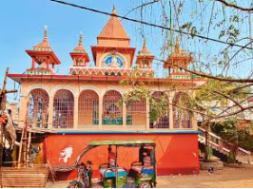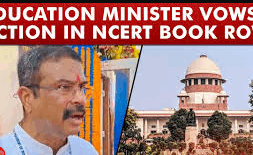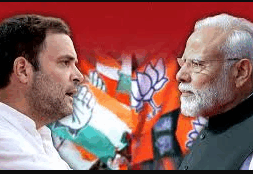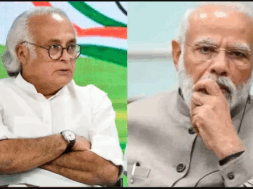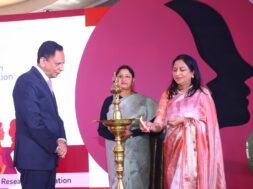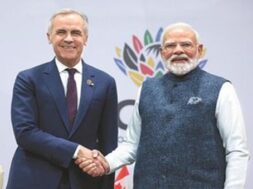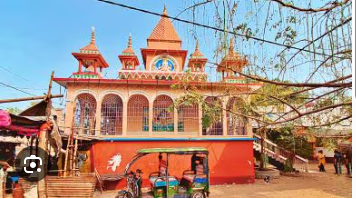
Manas Dasgupta
NEW DELHI, Mar 8: Threatened and denied the opportunity to enter a Shiva temple for centuries, a group of cobbler and weaver families in a village in Purba Bardhaman district in West Bengal have been finally assured by the administration of their right to access the temple and worship their God in future.
A meeting held recently after the residents of “Daspara” in the Gidhgram village were as usual refused entry in the Gidheswar Shiv temple, the only place of worship in the locality, on the Maha Shivratri Day last month, under the aegis of the district administration, adopted a resolution to end the discriminatory practice of centuries and allow the traditionally backward communities to enter the temple and offer prayer in future.
The families at Daspara area of Gidhgram village, all having ‘Das’ surnames and belonging to the traditional community of cobblers and weavers, have allegedly been forced to stay away from the steps of Gidheswar Shiv temple, by the shrine committee and other villagers on grounds that they belong to a “low caste.”
The discriminatory practice almost unheard in modern Bengal and violative of Article 25 of the Constitution which guarantees equal freedom of citizens to worship as a fundamental right has reportedly been in vogue ever since the temple was founded some 300 years ago, locals claimed.
The fight for their right has been initiated by some 550 members of 130 dalit families of Daspara and at the centre of the row is the Gidhagram Gidheshwar Shiv temple, believed to be around 200 years old. A plaque on the temple states that a renovated structure came up in 1997.
“For years, we have not been allowed to climb the steps and enter the temple. They call us ‘choto jaat (low caste) and ‘muchi jaat’ (cobbler caste). It’s either the temple committee or the locals who stop us,” said Ekkori Das, a farmer who lives with his wife and children. “Last year, I took fruits and flowers to offer puja. But members of the temple committee forced me to leave,” said Kalyani Das, a 58-year-old homemaker from Daspara.
Even the interventions from police and administration to facilitate the entry of Das families to pray at the temple during Shivratri failed to break the ice and the authorities decided to “play safe” for the time being. In addition to deny entry in the temple, the members of the “Das” community, who mostly work farm labourers and rear cattle at the village dairy centre, have also been subjected to economic ostracisation, the victims alleged.
It began with a written appeal to Katwa SDO by six Das families on February 24, which informed their decision to pray at the temple on Shivratri and sought the administration’s protection, prompting it to pull its socks and take notice of the medieval practice.
“We are abused, mistreated and thrown out of the temple whenever we go to pray. A section of villagers say we are untouchable cobblers belonging to low castes and, as such, have no right to visit the temple. Lord Mahadev will turn impure if we worship him at the temple,” the appeal, written in Bengali, read.
Although the victims failed to offer Shivratri prayers in the wake of persisting ground resistance, an administrative meeting on Friday, February 28 — attended by Katwa and Mangalkot MLAs, both from the ruling Trinamool Congress, SDO and SDPO (Katwa), a local community development officer and six members each of the temple committee and the Das families — passed a signed resolution to allow the aggrieved families to pray at the temple in future.
“Currently India is a secular nation and the Constitution has erased all discriminations based on caste, colour or race. All citizens of all caste and religion in this country are equal and everyone has equal rights to enter a temple to pray,” the resolution stated. That resolution, however, has remained on paper and yet to be enforced.
“The very next day, we received a call from police urging us to not visit the temple in the wake of the ongoing Shivratri fair and that it could escalate the law and order situation. We had no choice but to oblige,” Ekkori Das, who is also a signatory to the resolution, said.
“Police asked us to wait till the fair ended and, accordingly, called us again to prepare a temple visit on Friday, March 7. But when we reached there, despite being accompanied by the local BDO and seeing police presence around the temple, we sensed tension on the ground. The temple gates were closed and locked. We returned without offering prayers,” he added.
Dinabandhu Das, another villager, said they are waiting for police and administration to take affirmative steps to ensure security of the Das families. “We were ready with fruits and milk to offer our pujas to Lord Shiva. But we couldn’t because we fear for our safety. Let the administration look into this,” said Lipi Das, a woman from Daspara.
Ekkori informed that companies, under instructions from villagers, have stopped collecting milk from the Dases at the village milk collection centres from Friday evening, affecting the livelihood of some 30-40 families.
Dinabandhu Mondal, a temple committee member and among the resolution signatories, said, “They have never set foot inside the temple following an ancient tradition. No one in this village wants to break this age-old custom. If they try to force their way in, an unrest in the village is likely. The administration must tread cautiously.”
Mangalkot MLA Apurba Chowdhury, while rubbishing the possibility that his party may lose popular voting mandate if villagers were forced into submission, said the problem would take time to resolve. “The matter can only be solved through discussions,” he said.
Till reports last received, the SDO has called for another round of meetings with the resisting villagers on Saturday, with the Dases maintaining that chances of a breakthrough are likely slim. “We will soon implement the decision taken at the February 28 meeting. We are closely monitoring the situation,” said Anisha Jain, SDO (Katwa).
“We will either take this fight to the end and knock on the doors of Kolkata and Delhi or pack our belongings and leave this home of our ancestors,” Ekkori said. Officials said they were trying to navigate the fragile situation while keeping in mind the law and order situation, but for the families, the administration is dragging its feet.
“When they collect money for puja at the temple every year, we all pay. But they don’t allow us in. Our fathers and mothers could not offer puja, but times have changed,” said 40-year-old Subhas Das, a farmer who owns a small plot of land.
“We cannot fight with them. There are over 1,800 families in the village, and we are just 130. We are waiting for the administration to do something and end this discrimination. If not, we will knock on the doors of higher officials or the court. Times have changed; we will fight for our rights,” said Sukanta Das (35) of Daspara.
The temple committee cited “age-old traditions” that “cannot be broken in a moment”.
“I don’t want to talk on the issue. One should not hurt the feelings of the majority in the village,” said Ram Prasad Chakravorty, one of the members of the temple committee.
Ahinsa Jain, SDO (Katwa), said over the phone, “We cannot allow this in the 21st century. Everyone has equal rights, including the right to worship. We met with all stakeholders, public representatives, police and residents of Daspara. A resolution was passed to allow them to enter the temple. However, keeping in mind the law and order situation, we are trying to resolve the issue peacefully and talking to all stakeholders.”
Pulak Chandra Konar, the up-pradhan of Gidhagram Gram Panchayat, said, “People say that local zamindars established this temple about 200 years ago. Later, a committee was set up to run it. People of Daspara are Scheduled Caste from the cobbler community. They are not allowed in the temple. They want to worship, others will not allow them. We are caught in between. We want to avoid a clash and a law and order problem. We are ashamed. As a public representative, we cannot allow discrimination to continue.”
TMC MLA Apurba Chowdhury, who attended the meeting, said, “Such practices cannot be allowed in this age. We are talking with all those involved. But you must understand it is a sensitive issue.”
